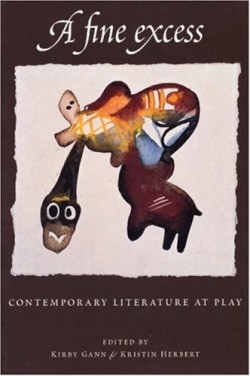A Fine Excess
Contemporary Literature at Play
The editors have mined enough lyrical gems—in poetry, prose, and short fiction—to decorate a fine literary crown. The premise behind the collection is Keats ideal of “a fine excess” where language languishes to evoke rich images. Some of the poetry revels in pun, and strong, often quirky, first-person voice drives most of the short stories. Wordplay by well-known masters, such as Rick Moody, e.e. cummings, Pete LaSalle, and C.K. Williams, co-mingle with works by here to fore unwrapped talent.
Although these poets’ and writers’ works appear playful on the surface, they address the hard reality of human life in ways sometimes only humor can. Moody’s main character holds down jobs at a fast-food joint, hawking Hot Bird on the street in a rubber chicken mask; and at the Mansion on a Hill, a wedding emporium in upstate New York. His obsession with banal employment masks the sadness and rage he suffers from his sister’s recent death, and he addresses his narrative to Sis.
LaSalle’s character, a Massachusetts transplant to the University of Texas, tells a smooth story as he shoots a hockey puck. In a clever overlay, the narrator constantly wonders aloud what his creative writing teacher would think of his story. (LaSalle incidentally has been the writing guru of UT.) Both Professor Norman and the illusive, beautiful Cressida recognize the narrator’s talents, but he chooses to pursue his love of crack and hockey. Hyped on words, smack, and hubris, he finds himself in a dizzying hockey match with the Latin locals. When he hotdogs, his “amigos” beat the lesson into him that he must remember from where he came—and the story ends in an intricate understanding of the hand-polished gleam of his father’s belt buckle that served as his call to manhood.
Sunetra Gupta’s “Memories of Rain” is just as rich in metaphor and image. Her main character is an Indian wife who has flashes of memory of the monsoon season when she was flushed toward her English husband. Now, she appears rigid to him, her memories forsake her sensuous self.
Short story writers may well be the poets among fiction writers. Their poetic counterparts assembled in this anthology all tell a good story. The editors seem to have chosen their selections of cunning words that impart truisms, as in Jeffrey McDaniels’ “The Jerk”:
You’re not really my new girlfriend,
just another flop sequel of my first one,
who was based on the true story of my mother.
Many of the poems take issue with—and pay tribute to—their mothers. In “My Mother’s Lips,” C.K. Williams remembers how his mother used to lipsync his thoughts slightly ahead of him, just as young parents tease the words out of their children to teach them vocabulary. Finally, in puberty he yells at her to stop and finds himself several years later mouthing his first poems out an Italian hotel window to an empty piazza with all the thrill and fear of a first kiss.
The real forbears of these poems are the words themselves, which these poets shape into new progeny. Timothy Geiger devotes his poem literally and figuratively to the letter “u.” Many of the poems are devoted to the literal music of poetry, as in Terence Hayes’ riff where Miles Davis fumes while John Coltraine hyper-extends his solo. These poets play with words like Heather McHugh’s Philadelphia elite play tennis in “Language lesson 1976.” She first introduces the reader to a middle-class boy visiting the liberty bell who begs his mother for a bicentennial burger, hold the relish, meaning forget it. Then she brings the reader to the courts and observes, “language is a game as well in which love can mean nothing.” She concludes the poem with a plea to her lover to
Make nothing without words,
and let me be
the one you never hold.
Most of the works gathered here exude richness and verity. The collection opens, after witty prefaces, with a prose piece by William Gass, in which he picks apart the potential meaning of a set of lines. He reigns undoubtedly as the safire of literary writers, yet this tedious piece belonged in a scholarly journal. Lest the reader think this anthology only appeals to English major types, skip the Gass and go right to “Inside Gertrude Stein.” What follows is a fine excess.
Reviewed by
Jo-Ann Graziano
Disclosure: This article is not an endorsement, but a review. The publisher of this book provided free copies of the book to have their book reviewed by a professional reviewer. No fee was paid by the publisher for this review. Foreword Reviews only recommends books that we love. Foreword Magazine, Inc. is disclosing this in accordance with the Federal Trade Commission’s 16 CFR, Part 255.

